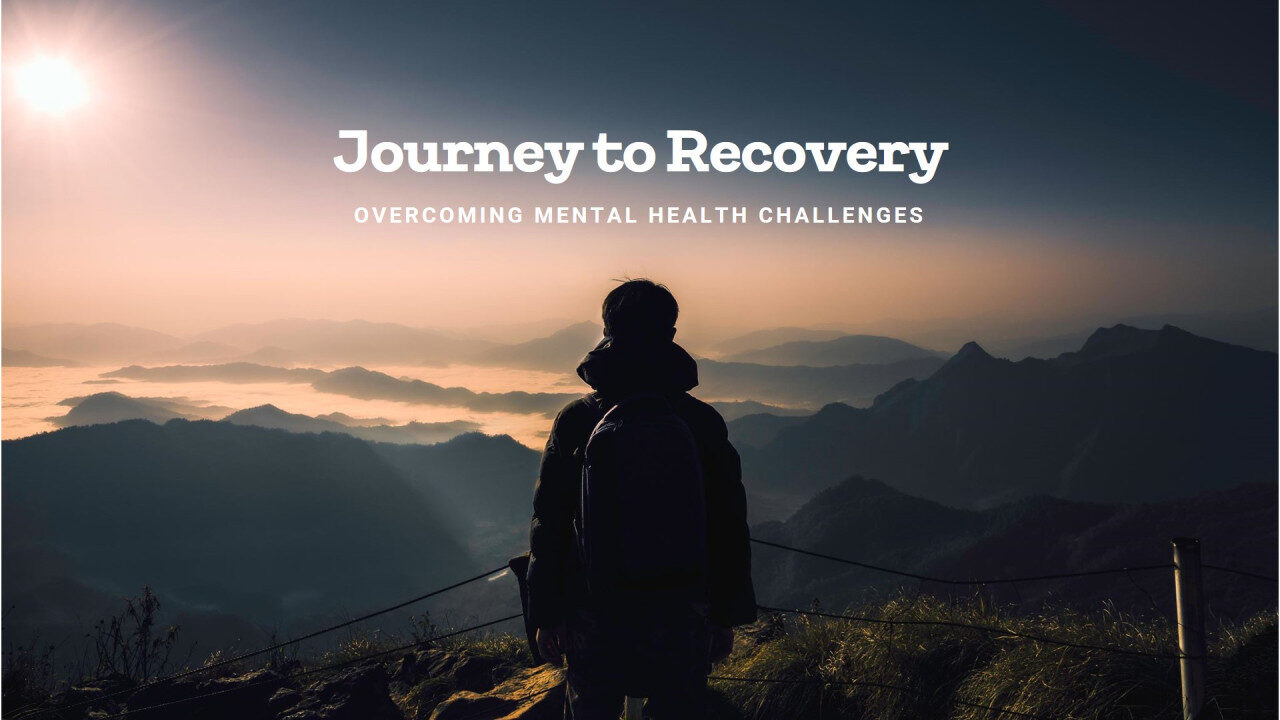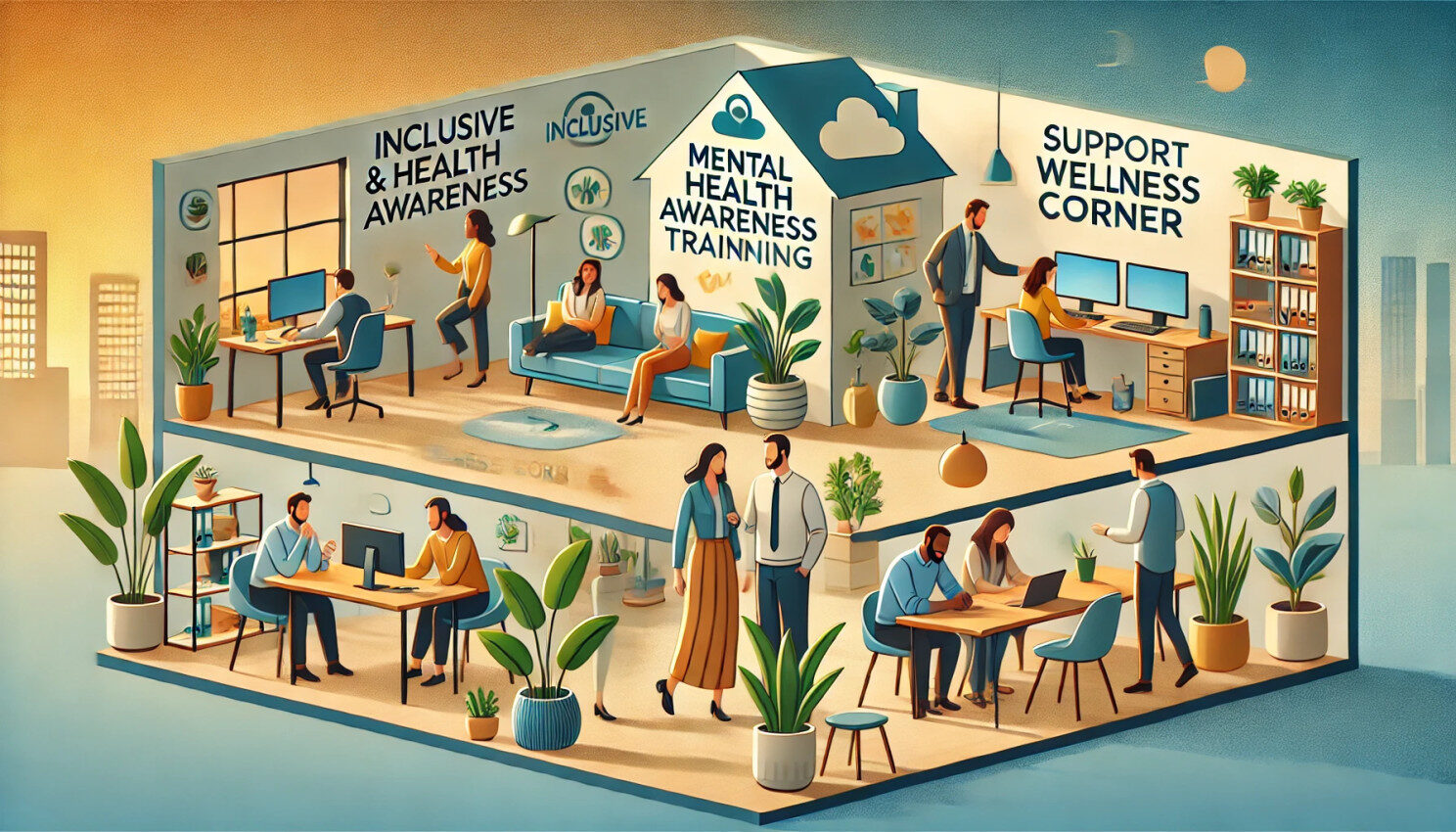

Recovery from mental health challenges is often misunderstood. For many, it conjures the idea of a definitive point in a journey where life returns to “normal,” as though healing is a straight road with a clear endpoint.
Recovery is not a destination!
It is a deeply personal and nonlinear journey; a maze of growth, setbacks, resilience, and rediscovery.


One of the most empowering truths about recovery is that our history, the things we have done, suffered, or not enjoyed, cannot be changed. It is unchangeable, yet profoundly meaningful. While we cannot rewrite the past, we can revisit it, understand it, and learn from it. Only by being open to what our history teaches us can we accept what today offers and what tomorrow might bring.
The future is not “hard-coded”; unexpected events may disrupt our plans, but these moments are not to be feared. They are opportunities to adapt, replan, and grow in ways we may not have anticipated.
At the heart of this process lies a universal truth: no matter what our circumstances or our challenges are, we possess two invaluable tools:
The heart sustains life, keeping the body and mind working.
The mind helps us define who we want to be, make the choices that shape our path, and accept the outcomes for what they offer.
Recovery honours this balance; it empowers individuals to make their own choices, reclaim their own agenda, and move forward with purpose.
This post is dedicated to exploring what recovery truly means. I will look beyond the surface, delving into the factors that shape this journey, inspire hope, and the steps that individuals can take to live and enjoy their lives. I will also examine the role society plays in empowering an environment where recovery can thrive.
Remember: Recovery is not just about survival; it is about learning to live fully, with hope as the anchor and resilience as the compass.

When you hear the word “recovery”, what comes to mind? For some, it may show images of a life free from struggle, a place where pain no longer exists, and happiness reigns. The truth is far more complex and, in many ways, more beautiful to experience.
Recovery is not a singular destination; it is a journey, a continuous process of growth, adaptation, and self-discovery.

The Substance Abuse and Mental Health Services Administration (SAMHSA) defines recovery as:
“A process of change through which individuals improve their health and wellness, live a self-directed life, and strive to reach their full potential.”
This definition captures the essence of recovery as a dynamic experience; one that is as individual as the person navigating it.
It is vital to challenge the misconception that recovery equates to being “cured.” For many people, recovery does not mean the absence of symptoms, but rather learning to live alongside them. It is about finding ways to live despite the challenges and embracing a life filled with meaning, connection, and self-determination.
Imagine being someone living with anxiety who learns to manage their symptoms through therapy, mindfulness, and support from loved ones. Their anxiety may still exist, but it no longer defines them. Recovery, in this sense, is about reclaiming their life and identity; not erasing the struggle, but integrating it into a larger story of resilience and growth.

Recovery is not confined to mental health alone. It touches every aspect of life, creating experiences that shape a person’s overall well-being. This approach is vital for understanding recovery as more than just a clinical process. Key areas include:
Each of these areas interconnect, creating a journey of recovery that reflects the complexity and richness of human life. For one person, recovery may mean returning to a beloved career; for another, it might mean simply feeling safe enough to leave the house.

Recovery is not linear. There will be highs and lows – a sine wave, moments of progress, and times of regression. This fluidity can be challenging, but it is also a natural and necessary part of the journey and of life itself. Each setback offers an opportunity to learn, grow, and build strength.
After months of therapy, they begin to feel more at ease in social settings, only to experience a setback after a triggering event. Instead of viewing this as a failure, they learn to approach it with compassion, recognising that setbacks are part of the process. Over time, they build resilience and find new strategies for managing PTSD, redefining what recovery actually means.

There is no universal blueprint for recovery. Each person’s journey is shaped by their experiences, needs, and aspirations. It is a deeply personal process that honours individuality and diversity. What works for one person may not work for another, and that is okay.

Recovery is about finding what resonates with you whether that is through therapy, creative expression, spirituality, peer support, or a combination of approaches. It is about reclaiming the ability to make choices with your life and defining success on your terms.
Recovery is not a one-size-fits-all concept. It is a spectrum of experiences, emotions, and growth that reflect the diversity of human life. By embracing the multifaceted and fluid nature of recovery, we can begin to see it for what it truly is: a journey of resilience, connection, and hope.
Recovery is shaped by a delicate interplay of internal strength and external influences. While each journey is unique, there are certain key factors that consistently shape and support the recovery process. By understanding these elements, individuals and their support systems can better navigate the complexities of mental health recovery.
Hope is the cornerstone of recovery. It is the belief that a better future is possible, even in the darkest moments. Without hope, the recovery journey can feel insurmountable.
Research published in Psychiatric Services (March 2023) highlights that hope is one of the strongest predictors of positive recovery outcomes.
Hope does not erase challenges, it provides the motivation to face them. It reminds us that setbacks are temporary, and progress is always within reach, no matter how small. For many, hope is reignited through connection whether it is a compassionate friend, an inspiring story, or a professional who believes in their ability to heal.

Recovery is not meant to be navigated alone. Strong support systems whether they come from family, friends, peer groups, or professional networks are vital to fostering resilience and promoting healing. Support systems provide a sense of belonging and encouragement, but they also serve as a safety net during moments of struggle.
Research has shown that peer support can improve recovery outcomes by reducing feelings of isolation and building trust.

It is important, however, to balance support with boundaries. A healthy support system respects the autonomy of the individual, offering encouragement without taking over their recovery journey.
Empowerment is the process of regaining control over your life and choices. It is about moving from a position of feeling helpless to recognising the ability to shape your future. Empowerment is a deeply personal journey that often involves education, self-advocacy, and access to resources. For instance, an individual navigating anxiety may feel empowered when they learn practical coping techniques through therapy or mindfulness practices. Empowerment also involves the ability to make decisions about treatment and recovery on your own terms, empowering a sense of self-determination.
Professional support whether through therapy, medication, or holistic interventions plays a critical role in recovery. Mental health professionals provide tools, insights, and strategies that help individuals understand and manage their challenges.
Therapy options such as cognitive behavioural therapy (CBT) or dialectical behaviour therapy (DBT) have been proven effective for conditions like anxiety, depression, and borderline personality disorder. In some cases, medication can help stabilise symptoms, creating space for individuals to focus on healing.
Innovative approaches, such as trauma-informed care or emerging therapies like MDMA-assisted treatment for PTSD, are expanding the landscape of mental health care, offering new hope for those who may not have responded to traditional methods.
Society and systemic factors have a profound impact on the recovery process. Accessible healthcare, workplace accommodations, and anti-stigma campaigns are all critical components of a recovery-oriented society.
These factors – hope, support, empowerment, professional help, and systemic support, are not isolated. They work in tandem, influencing and reinforcing one another. For example, a supportive environment can bolster hope, while professional guidance can empower individuals to take charge of their recovery. Recognising and addressing each of these elements can create a solid foundation for long-term resilience and growth.
Recovery is shaped by a web of interconnected factors, each playing a vital role in the journey toward healing and growth. For those on the path of recovery, understanding these factors can provide clarity, direction, and a renewed sense of purpose.
Recovery is not a concept, it is a reality lived by countless individuals every day. These journeys, marked by pain, hope, and transformation, reveal the incredible strength of the human spirit. Stories of resilience are powerful not just because they inspire but because they remind us that recovery is possible. They help dismantle stigma, build understanding, and create a sense of shared humanity. The following are real-life accounts of recovery that highlight the diversity and complexity of this journey.

 Matt Haig, author of Reasons to Stay Alive (2015), offers a raw and deeply personal account of his battle with severe depression and anxiety. At his lowest point, Matt felt overwhelmed by despair, unable to see a future for himself. Yet through therapy, the unwavering support of loved ones, and the gradual rebuilding of his life, he found reasons to keep going.
Matt Haig, author of Reasons to Stay Alive (2015), offers a raw and deeply personal account of his battle with severe depression and anxiety. At his lowest point, Matt felt overwhelmed by despair, unable to see a future for himself. Yet through therapy, the unwavering support of loved ones, and the gradual rebuilding of his life, he found reasons to keep going.
His journey reminds us that recovery is often slow and unsteady, marked by small steps forward rather than grand leaps. Matt’s openness in sharing his story has not only helped him heal but has also inspired millions around the world to speak openly about their own mental health struggles.
Maya’s story reflects the resilience required to live with post-traumatic stress disorder (PTSD). After surviving a traumatic car accident, Maya faced nightmares, flashbacks, and debilitating anxiety that left her feeling trapped in a constant state of fear. Recovery seemed impossible.
Through a combination of therapy, mindfulness practices, and the support of a peer group who understood her pain, Maya began to reclaim her life. She found creative outlets, like painting and journaling, to process her emotions and learned to approach setbacks with self-compassion. Today, Maya describes her recovery not as a destination but as an ongoing journey of understanding herself and her triggers.
Her story illustrates that recovery is not about forgetting the past but learning to live alongside it with strength and grace.
Genevieve Mora, co-founder of Voices of Hope, struggled with obsessive-compulsive disorder (OCD) and anorexia during her teenage years. For years, she felt isolated, ashamed, and unable to seek help. Her turning point came when she shared her experiences with a trusted friend, who encouraged her to seek professional support.
Genevieve’s recovery journey was far from easy, but it taught her the power of vulnerability and the importance of seeking help. She now uses her platform to advocate for mental health awareness, inspiring others to embrace their own recovery journeys.
Her story highlights that recovery is not just about healing but about giving back and using one’s experiences to empower others.
 These stories, while unique, share common threads of courage, support, and growth. They remind us that recovery is not a one-size-fits-all journey. Each person navigate the journey in their own way, shaped by their experiences, resources, and resilience.
These stories, while unique, share common threads of courage, support, and growth. They remind us that recovery is not a one-size-fits-all journey. Each person navigate the journey in their own way, shaped by their experiences, resources, and resilience.
Shared stories also play a pivotal role in breaking down the stigma surrounding mental health. When individuals like Matt Haig or Genevieve Mora share their struggles, they create a ripple effect, encouraging others to seek help and begin their own journeys of recovery.

Stories of resilience are more than narratives; they are lifelines. They remind us that recovery is possible, even in the face of immense struggle. These accounts of hope and strength serve as a beacon for those navigating their own paths, proving that, while recovery is deeply personal, it is also a journey we share together.
Recovery is a deeply personal journey, but there are practical steps that can help guide us through the process. These steps are not prescriptive or universal; they are tools to help each of us take control of our mental health, find our own path, and build resilience along the way.
Recovery can feel overwhelming, especially when faced with the enormity of mental health challenges. Breaking the process into smaller, manageable steps can make it feel less daunting.
These small victories build momentum, creating a foundation of confidence and hope.
Professional guidance can provide the help, assistance, and insights needed to navigate the complexities of recovery. Mental health professionals such as therapists, counsellors, or psychiatrists bring expertise and objectivity to the process.
Professional support can act as a guiding hand, helping individuals understand their challenges and build strategies to overcome them.
Recovery thrives in the presence of connection. Building a network of supportive relationships can provide encouragement, accountability, and understanding.
Connection is a powerful antidote to the loneliness that often accompanies mental health struggles.
Recovery is not a straight path, and setbacks are inevitable. Self-compassion, the ability to treat yourself with kindness and understanding during difficult moments, is a vital skill.
Self-compassion is an act of strength, allowing you to navigate recovery with patience and resilience.
Self-care is the foundation of mental health. It involves taking proactive steps to nurture your body, mind, and soul.
Self-care is not selfish; it is a necessary component of recovery that allows you to show up fully for yourself and others.
Recovery is not about perfection; it is about progress. It’s about finding what works for you, being open to change, and adapting as needed.
Practical steps are the opportunities that pave the way to recovery, but the journey is ultimately about finding what works for you. By setting achievable goals, seeking support, practising self-compassion, and prioritising self-care, we can all take meaningful steps toward reclaiming our lives. Remember, recovery is not about the destination; it is about the courage to keep moving forward, one step at a time.
While it is deeply personal, recovery is also profoundly influenced by the environment in which we live. Society plays a critical role in shaping the recovery process, either as a source of support and empowerment, or as a barrier riddled with stigma and inaccessibility.
A recovery-oriented world is one that prioritises understanding, compassion, and systemic change. It is a society where individuals are not defined by their mental health challenges but supported in reclaiming their lives with dignity and hope.
Stigma remains one of the most significant barriers to recovery. Misunderstandings, stereotypes, and shame often prevent individuals from seeking help or speaking openly about their struggles.
Initiatives like Time to Change (UK) have shown that targeted campaigns can challenge misconceptions and reduce stigma surrounding mental health. These efforts encourage open conversations and normalise seeking support.
Embedding mental health education into curriculums and professional training equips individuals with the knowledge to understand and address mental health challenges. Knowledge is one of the most powerful antidotes to stigma.
The media has a responsibility to portray mental health accurately and sensitively. Positive representation can break down stereotypes and empower empathy.
When society shifts from judgment to understanding, it creates a safer environment for an individual to begin their recovery journey.
Access to timely and affordable mental health care remains a significant challenge worldwide. Long waiting lists, financial constraints, and geographic barriers often leave individuals without the support they desperately need.
Breaking down systemic barriers ensures that recovery is within reach for everyone, regardless of their circumstances. Remember! we are all human.

Workplaces are a significant part of many people’s lives, and they play a crucial role in supporting recovery. Employers have a responsibility to build environments where employees feel safe, valued, and supported.
Offering options like remote work, flexible hours, or phased returns to work can ease the pressure on individuals navigating recovery.
Providing access to counselling, mental health resources, and wellness programmes can offer employees vital support.
Educating leaders and managers on mental health ensures they can recognise signs of struggle, provide support, and create a culture of openness.

An inclusive workplace acknowledges that mental health is just as important as physical health, enabling employees to thrive without fear of discrimination or judgment.
Communities are the backbone of a recovery-oriented world. A strong sense of belonging and connection can be transformative for everyone on their recovery journey.
When communities actively support recovery, they become places of hope and transformation.
True recovery-oriented societies require systemic change at the policy level. Advocacy and legislative reform are essential for addressing the root causes of mental health disparities.
Policy change is the foundation for creating a society where recovery is not an exception but an expectation.
A recovery-oriented world is not built overnight. It requires a collective effort to challenge stigma, improve access to care, apply inclusive workplaces, build supportive communities, and advocate for systemic change. When society takes an active role in supporting recovery, it creates a ripple effect that empowers individuals to heal, grow, and reclaim their lives.
Recovery is not just an individuals journey, it is a shared responsibility.
Recovery is not about perfection or reaching an idealised state of being. It is about progress, growth, and learning to embrace life with all its complexities. For those navigating mental health challenges, recovery is not the end of the story but the beginning of a new chapter; one that is filled with resilience, hope, and self-discovery.


Throughout this post, I have explored what recovery truly means (my personal opinion). It is not a one-size-fits-all concept but a deeply personal journey shaped by individual experiences and aspirations. Recovery encompasses more than mental health, it touches emotional well-being, physical self-care, meaningful connections, and a sense of purpose. It is a multitude of experiences that cannot be confined to a single existence.
I hope that with this post I have also recognised the factors that shape recovery: the power of hope, the importance of support systems, the role of professional help, and the need for systemic changes that make recovery possible for everyone. Recovery is not a solo endeavour; it thrives in environments that empowers compassion, understanding, and accessibility.
Recovery is not linear, and it is rarely easy. There will be setbacks, challenges, and moments of doubt. But every step forward, no matter how small, is an act of courage. It is a reminder that recovery is not about erasing the past but learning to live alongside it with strength and grace.
To anyone on the path of recovery, know this: your journey is valid, your progress matters, and you are not alone. The road may be winding, but with each step, you are moving closer to a life filled with meaning and purpose.
Recovery is also a society responsibility. When we challenge stigma, advocate for accessible care, and create inclusive spaces, we are not just supporting individuals, we are building a world where recovery can thrive. It is a collective effort, one that requires compassion, understanding, and action from all of us.
The future is not hard-coded. Life is unpredictable, and challenges may arise when we least expect them. Within that unpredictability lies possibility. Recovery teaches us to adapt, to reframe setbacks as opportunities, and to move forward with hope as our anchor.

Microsoft Solution Architect, Senior Project Manager, and Mental Health Advocate